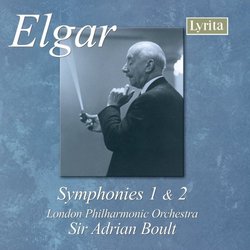Definitive Elgar Performances
D. A Wend | Buffalo Grove, IL USA | 08/19/2009
(5 out of 5 stars)
"Sir Edward Elgar wrote his First Symphony in 1908 in four months. It was dedicated to conductor Hans Richter who conducted the premiere with the Halle. It immediately became a popular symphony and received 100 performances during its first year.
The long first movement begins with a march-like melody that reappears frequently in the symphony. A second melody is introduced following the introduction - a passionate and somewhat restless theme. The Scherzo is boisterous but switches to a more reflective mood as the movement ends. The Adagio picks up on the mood at the end of the Scherzo. The movement is one of contemplation and was described by one of Elgar's friends as "bringing us near to heaven." The Finale returns to the tempestuous mood of the first movement then settles into a sunny melody and ends with the march melody that announced the symphony.
The Second Symphony was composed during 1910 and 1912 (some of the music was sketched as far back as 1903); it is an autobiographical work that Elgar termed a "pilgrimage of the soul." The symphony was dedicated to the memory of King Edward VII but it was not composed with the monarch in mind. Elgar conducted the premiere in 1911 but the symphony had a cold reception. Adrian Boult conducted the symphony in 1920 and it was finally well received. It is interesting that T. E. Lawrence loved this music and wrote to Elgar congratulating him.
The symphony explodes to life after a sustained chord with a march-like melody. The momentum is broken by a theme Elgar described as a ghost melody, which occurs again later in the music. It turns a bit sinister with the introduction of throbbing brass - a reflection of the passage that occurs in the Rondo. The original vigorous tempo is resumed and carries through to a brilliant flourish. The slow movement is a somber meditation that slowly rises to a heroic climax. The march-like melody resumes and the movement closes quietly. The Rondo is a fast and furious with a calm pastoral section that gives way to a pulsing passage that slowly grows until the entire orchestra takes it up with the percussion relentlessly pounding. Elgar described this passage as "the throbbing in the head during some fever." The Rondo resumes with the prior tempo and ends dramatically. The Finale is noble and dignified but becomes more restless. The principle melody from the first movement is introduced and the symphony ends serenely.
Sir Adrian Boult had a long association with the music of Elgar and conducts the London Philharmonic Orchestra in definitive performances. The quality and balance of the recordings is excellent and the accompanying booklet has very good descriptions of the music.
"
Magnificent English national symphonies
Larry VanDeSande | Mason, Michigan United States | 04/03/2010
(5 out of 5 stars)
"The Amazon description for this release, taken literally from Lyrita's notes by Michael Kennedy, suggests composer Sir Edward Elgar (1857-1934) created the new English national style in these two symphonies and his other popular compositions. What is does not say that is perhaps more important is that Elgar may have reintroduced the world to English music.
Prior to Elgar developing the new national style through his noble and romantic scores that used his unique nobilmente marking you find in the first movement of both symphonies, England went a century without a world class composer. Before Elgar arrived on the world stage, one has to go back to Henry Purcell (1659-95) and Thomas Arne (1710-78) to find an English composer of world status.
Once Elgar began to develop the new, more romantically charged style in the Edwardian era, a boatload of followers came afterward writing world class compositions. These included Gerald Finzi (1901-56), Sir Arnold Bax (1883-1953), Herbert Howells (1892-1983), William Walton (1902-83) and Sir Michael Tippett (1905-98). Others of the era that blossomed in Elgar's lifetime that followed a different path included Ralph Vaughan Williams (1872-1958) whose chief influence was folk music, Gustav Holst (1874-1934) who had an abiding interest in Eastern music, and Sir Arthur Sullivan (1842-1900), whose collaborations with H.S. Gilbert resulted in opera for the people.
So it was that Elgar became the new champion of English music, and in doing so destroying the myth that all Englishmen were gentlemen in terms of emotional content. The two symphonies here, along with his pomp and circumstance marches, cello and violin concertos, and oratorio The Dream of Geronitus helped create the new English style.
Here, the two symphonies are performed by one of England's greatest conductors, Sir Adrian Boult (1889-1983) whose life and times mirrored Elgar's and who was an exponent of the composer's music during both their lives. Boult conducted the Elgar symphonies often and his first recording with the London Philharmonic Orchestra, his partner here, was of Elgar's Falstaff Elgar: Falstaff; Enigma Variations. Together, Boult and Elgar were likely the best match to recreate the nobly romantic music the composer envisaged for the nation.
The recordings here, from 1968, were first recorded on high quality LPs by Lyrita, which in those days was then an emerging audiophile label that promoted English music and composers. They were recreated on CD in 2007 to widespread world acclaim. While Boult again recorded the two symphonies for EMI in the penultimate year of his life Elgar: Symphonies 1 & 2, these recordings have a special place for Elgarians and lovers of English music even though Elgar's music is never as straightforward as the average German romantic.
The two symphonies came to light along somewhat different paths. The Symphony No. 1 in A flat, Op. 55 was composed 1907-8 and was premiered in December 1908 in Manchester to acclaim. It was very popular with audiences immediately and was performed more than 100 times in its first year. With no program and no composer dedication, some suggest it represents an English "eroica" symphony that parallels Beethoven's Symphony No. 3. It begins with a lengthy nobilmente theme that is cyclic through the movements and closes the work almost 50 minutes later.
The Symphony No. 2, composed 1910-11 and premiered May 1911 in London, did not arrive with the same adulation. A more oblique composition dedicated to the memory of the late King Edward VII, Elgar was surprised and displeased with the public acceptance. Stories are legion that he rhetorically asked why people didn't come to hear it and, about those who did, why they sat like "stuffed pigs" during its playing. Many call this Elgar's most autobiographical composition, suggesting its Edwardian slant beging representative of the composer's life, intent and purpose.
There have been many recordings of these two symphonies and a handful of a third symphony Anthony Payne put together in the 1990s from Elgar's sketches. Boult and the other great English conductor of the 20th century, Sir John Barbirolli, both expired before No. 3 and both recorded the first two symphonies in stereo Elgar: Symphonies Nos. 1 & 2; In the South; Serenade for Strings. With Boult projects more of the composer's nobilmente characteristic, Barbirolli is a more passionate advocate who tries to find greater opulence in the music.
These two giants of the English podium maintain their positions today in light of challenges from newer generations of condcutors including the current godfather of English conductors, Colin Davis. Davis has recorded all the Elgar symphonies in recent years on the LSO Live label on Sir Edward Elgar: Symphony No. 1 - Sir Colin Davis / London Symphony Orchestra, Sir Edward Elgar: Symphony No. 2 - Sir Colin Davis / London Symphony Orchestra and Sir Edward Elgar: Symphony No. 3 (Sketches elaborated by Anthony Payne) - Sir Colin Davis / London Symphony Orchestra. They have been universally accepted by both music buyers and critics.
Any of these recordings gives the listener a fine introduction into the world of Elgar's national music. However, the Lyrita recordings under Boult have maintained a safe place in the world of Elgar worship that is not likely to be superceded by any new conductor, orchestra or style, mostly because they represent such a fine kinship of collaboration, playing and idiomatic response to the composer's ideas.
Today, you can find super audio recordings of Elgar symphonies Elgar: Symphony No. 1; Organ Sonata [Hybrid SACD], Elgar: Symphony No. 2; In the South [Hybrid SACD] and newer sets in better digital sound Elgar: Symphonies #1 & 2, Cockaigne Overture, Sospiri; London Symphony Orchestra but you cannot find better work from Boult. This set is a treasure anyone that enjoys Elgar should hear while they are on the planet.
"


 Track Listings (4) - Disc #1
Track Listings (4) - Disc #1

